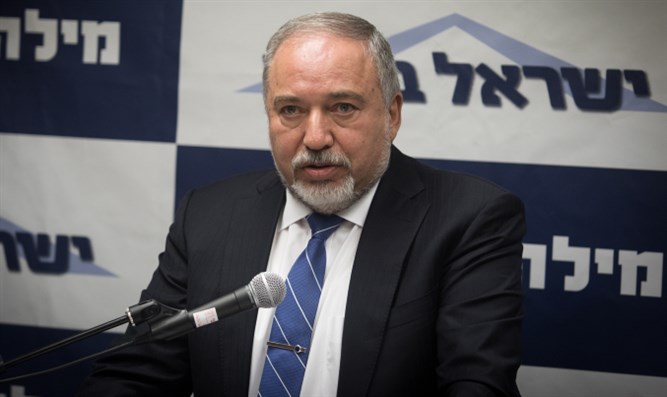Israel’s hawkish Defense Minister Avigdor Liberman announced his resignation from the government Wednesday, citing his opposition to a cease-fire with Hamas a day after the worst outbreak of violence with the Islamist militant group running the Gaza Strip since a 50-day war in the summer of 2014.
The cease-fire announced by Hamas Tuesday night, was still holding Wednesday even though there was no official Israeli confirmation it had been accepted. Residents of the southern Israeli communities, the target of more than 400 rockets fired by militants in the Gaza Strip Monday night and Tuesday, protested at what they called the government’s capitulation to Hamas.
In a televised news conference, Liberman, who became defense minister in 2016, also cited his displeasure with accepting the terms of the Hamas requested cease-fire.
“What happened yesterday with the cease-fire and the entire process of reaching an agreement with Hamas amounts to surrendering to terror, there is no other explanation,” Liberman said. “ What we have done recently is buy quiet for the short term but we will end up paying a high price for our long term quiet.”
He said his resignation comes after weeks of disagreement with Prime Minister Benjamin Netanyahu over a course of action on how to handle ongoing tensions with the coastal Palestinian enclave, whose Hamas rulers have called Israel’s destruction.
With Liberman’s departure, it is likely that Netanyahu will call for new elections to shore up his support as leader. Political analysts and media commentators have long suspected him of wanting to hold elections before his full term in office ends in another year.
Even though he heads a stable, right-wing coalition, a win sooner rather than later might help distract attention from the ongoing criminal investigations against him, which look set to bring an indictment that could possibly lead to a very public trial.
Netanyahu, who in recent days stated he does not believe there is a diplomatic solution to Gaza and has, at the same time resisted military action, held a marathon meeting with his security cabinet, including Liberman, through much of the day Tuesday. A meager statement following the meeting said only that the Israeli military had been “instructed to continue its operations as necessary.” Israeli news outlets later reported that a cease-fire had been agreed to.
Israeli officials’ reluctance to acknowledge a cease-fire underscores the delicate balancing act they are facing as they try to reach a long-term agreement with Hamas. Israel and Hamas have fought three deadly wars in 10 years, with flare-ups becoming increasingly frequent in recent months as Hamas has urged residents to protest at the fence along the border with Israel. More than 200 Palestinians have been killed in the weekly protests, which Israel calls riots and a cover for terrorist attacks.
On Wednesday, Netanyahu took part in a ceremony for Israel’s first prime minister, David Ben Gurion, at his grave in southern Israel, the area that faced the brunt of the barrage of rockets Monday and Tuesday.
“A leader must be attentive to his people, and we have a wise people here, but in times of emergency and when making crucial decisions in the field of security, the public cannot always be a partner to the crucial considerations,” he said. “At these moments, leadership is not about doing the easy thing, leadership is about doing the right thing, even if it is difficult.”
Before the latest flare-up, there had been signs that the two sides were close to reaching an understanding to restore calm, at least for a short while. It would have entailed economic aid for Gaza, including a cash injection and international reconstruction projects, in return for Hamas clamping down on border demonstrations and preventing the use of incendiary kites that have been launched across the border fence into Israel.
But by Sunday the agreement appeared to be flailing after a botched undercover Israeli military operation inside Gaza was revealed, leading to an exchange of fire and the deaths seven Palestinian militants, including a Hamas commander. A senior Israeli officer was also killed.
Monday and Tuesday’s flare-up lead to further deaths on both sides, with one man killed in the Israeli city of Ashkelon after a direct rocket hit and six Palestinians, including some militants, killed by Israeli airstrikes.
Tamar Zandberg, head of the left-wing Meretz party, who visited the site of Tuesday’s rocket strike in Ashkelon said the situation with Gaza was untenable for Israel and residents in the south in particular.
“The problem is that the prime minister is always going for short-term solutions. While I support short-term solutions, they need to be part of a longer process,” Zandberg said. “I think that as soon as there is a cease-fire, everything needs to be done to reach a wider peace process.”
Right wing leaders in Israel disagree with Netanyahu’s methods for different reasons and, like Liberman, have been pushing for more decisive military action to solve the ongoing tension.
Israeli Education Minister Naftali Bennett, leader of the right-wing Jewish Home party, has also been critical of attempts to broker a deal with Hamas. On Tuesday, he told The Post he was also against a cease-fire with Hamas, in keeping with his position expressed in recent months.
Source: Washington Post


